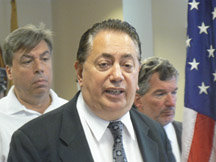“Unfortunately, it often takes a tragedy before we find a flaw in the current law.”
State Sen. Nicholas Sacco made that comment at a press conference on Monday is in reference to the recent Casey Anthony trial – the trial of a Florida woman whose daughter disappeared for a month without her reporting it.
Her daughter, 2-year-old Caylee Anthony of Orlando, was found dead in a wooded area on Dec. 11, 2008, nearly five months after she was finally reported missing. Her mother was accused of her death, but ultimately was convicted on a lesser charge.
The appropriately named “Caylee’s Law” was introduced at the press conference by Sacco, who also serves as the mayor of North Bergen. The bill would make it illegal for a parent or guardian to fail to report a missing child under the age of 13 within 24 hours.
“There were certain parts of the law that are just not where they should be.” – Nicholas Sacco
____________
Guidelines
According to County Prosecutor Edward DeFazio, there is currently no criminal penalty for failing to report a child as missing. As a fourth degree crime, the bill would introduce a penalty of imprisonment of up to 18 months, a fine of up to $10,000, or both.
Under the current law, a failure to report a death is a disorderly person’s offense, punishable by up to six months in prison and fine of up to $1,000. Under the new legislation, this would also be upped to a crime of the fourth degree.
Said Sacco of the bill, “With the verdict, as shocking as it was, it became obvious that there were certain parts of the law that are just not where they should be. A person could not report a child missing for 30 days and it wasn’t a crime.”
“What I’ve done today is introduce a bill,” continued Sacco, “and this bill corrects a few flaws that I believe I’ve found and a number of other people found.”
Among a number of concerns raised was that sometimes parents are unaware that their children have gone missing. Sacco provided an example in which a parent or guardian could theoretically believe their child to be at a friend’s house, when in actuality the child is missing. In this circumstance, the 24-hour period would not have begun.
“However,” explained Sacco, “When the parent calls over and finds out the child didn’t show up or the child left [the friend’s home] and hasn’t arrived back, that’s when the time of 24 hours takes place.”
Are laws named after victims well-founded?
Critics have often argued that laws named after victims are often emotional or knee-jerk reactions. According to these critics, New Jersey laws, such as “Megan’s Law,” which was put into place after 7-year-old Megan Kanka was raped and murdered by a sex offender in her neighborhood, are not well-founded..
In fact, a recent study funded by the U.S. Department of Justice and conducted in 2008 by researchers concluded that “Given the lack of demonstrated effect of Megan’s Law on sexual offenses, the growing costs may not be justifiable.”
Proponents of this law, however, argue that people should know if convicted sex offenders reside in their neighborhood.
Critics of Caylee’s Law, such as Radley Balko, who wrote about it the Huffington Post, argue that the bill is based on emotion rather than reason. Balko contended in a recently published piece that innocent people may fail to report a death within 24 hours because of shock, grief, or mental breakdown. Added Balko, “This is about vengeance. They’re [the bill’s supporters] angry at this verdict.”
Sacco was not unaware of these critics. At the press conference, Sacco said his bill is capable of being revised as to avoid any notion of it being deemed a bill founded on emotion.
“That’s why I call it a work in progress,” he said. “They’re [lawmakers] going to review each aspect of it and make it as meaningful as possible.”
Currently, a Change.org petition to enact “Caylee’s Law” has over 1,100,000 signatures.
Sacco added that Caylee’s Law would have given defendants such as Casey Anthony, who was convicted only with lying to the police, a harsher sentence.
“A lot of the outcry over the case wasn’t just the verdict – it was that there was nothing that could be done after the verdict,” said Sacco, who added that Caylee’s Law would add two more charges in such circumstances. “And that’s what this does.”
Said Sacco, “I want to make an extremely good bill, and I need help to do that. I attempted to see that all angles were covered, but I’m open to suggestions.”
What do you think of Senator Sacco’s bill? Do you believe there are any holes, or are all bases covered? Is it necessary, or just a knee-jerk reaction to a tragedy? Comment in our poll at hudsonreporter.com!
Stephen LaMarca may be reached at slamarca@hudsonreporter.com.
